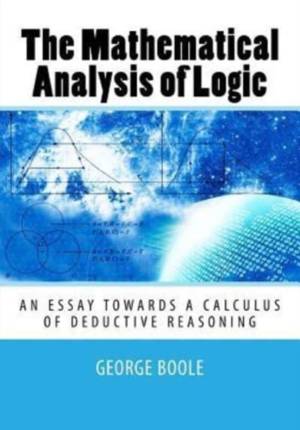
- Retrait gratuit dans votre magasin Club
- 7.000.000 titres dans notre catalogue
- Payer en toute sécurité
- Toujours un magasin près de chez vous
- Retrait gratuit dans votre magasin Club
- 7.000.000 titres dans notre catalogue
- Payer en toute sécurité
- Toujours un magasin près de chez vous
The Mathematical Analysis of Logic
An Essay Towards a Calculus of Deductive Reasoning
George Boole
Livre broché | Anglais
11,45 €
+ 22 points
Format
Description
The Theory of Symbolical Algebra, are aware, that the validity of the processes of analysis does not depend upon the interpretation of the symbols which are employed, but solely upon the laws of their combination. Every system of interpretation which does not affect the truth of the relations supposed, is equally admissible, and it is thus that the same process may, under one scheme of interpretation, represent the solution of a question on the properties of numbers, under another, that of a geometrical problem, and under a third, that of a problem of dynamics or optics.This principle is indeed of fundamental importance; and it may with safety be affirmed, that the recent advances of pure analysis have been much assisted by the inuence which it has exerted in directing the current of investigation. But the full recognition of the consequences of this important doctrine has been, in some measure, retarded by accidental circumstances. It has happened in every known form of analysis, that the elements to be determined have been conceived as measurable by comparison with some fixed standard. The predominant idea has been that of magnitude, or more strictly, of numerical ratio. The expression of magnitude, or of operations upon magnitude, has been the express object for which the symbols of Analysis have been invented, and for which their laws have been investigated. Thus the abstractions of the modern Analysis, not less than the ostensive diagrams of the ancient Geometry, have encouraged the notion, that Mathematics are essentially, as well as actually, the Science of Magnitude.The consideration of that view which has already been stated, as embodying the true principle of the Algebra of Symbols, would, however, lead us to infer that this conclusion is by no means necessary. If every exist ing interpretation is shewn to involve the idea of magnitude, it is only by induction that we can assert that no other interpretation is possible. And it may be doubted whether our experience is sufficient to render such an induction legitimate. The history of pure Analysis is, it may be said, too recent to permit us to set limits to the extent of its applications. Should we grant to the inference a high degree of probability, we might still, and with reason, maintain the sufficiency of the definition to which the principle already stated would lead us. We might justly assign it as the definitive character of a true Calculus, that it is a method resting upon the employment of Symbols, whose laws of combination are known and general, and whose results admit of a consistent interpretation. That to the existing forms of Analysis a quantitative interpretation is assigned, is the result of the circumstances by which those forms were determined, and is not to be construed into a universal condition of Analysis. It is upon the foundation of this general principle, that I purpose to establish the Calculus of Logic, and that I claim for it a place among the acknowledged forms of Mathematical Analysis, regardless that in its object and in its instruments it must at present stand alone.That which renders Logic possible, is the existence in our minds of general notions, "our ability to conceive of a class, and to designate its individual members by a common name. The theory of Logic" is thus intimately connected with that of Language. A successful attempt to Express logical propositions by symbols, the laws of whose combinations should be founded upon the laws of the mental processes which they represent, would, so far, be a step toward a philosophical language.
Spécifications
Parties prenantes
- Auteur(s) :
- Editeur:
Contenu
- Nombre de pages :
- 90
- Langue:
- Anglais
Caractéristiques
- EAN:
- 9781505487435
- Date de parution :
- 11-12-14
- Format:
- Livre broché
- Format numérique:
- Trade paperback (VS)
- Dimensions :
- 178 mm x 254 mm
- Poids :
- 173 g







